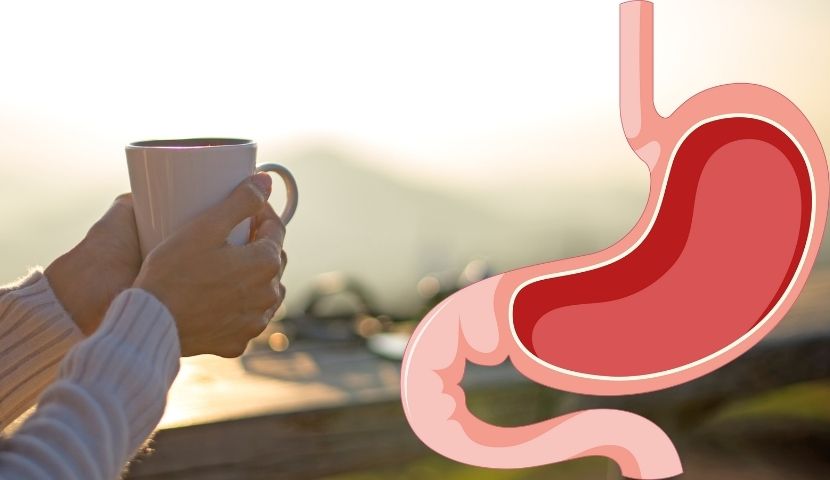For many people, the first sip of coffee in the morning is not just a ritual—it’s an essential part of starting their day. The rich aroma and bold flavor of coffee can instantly boost mood and energy. But is it safe or advisable to drink coffee on an empty stomach in the morning? This question has led to a variety of opinions and studies, making it a topic of interest for both coffee lovers and health-conscious individuals.
In this article, we’ll explore the effects of drinking coffee on an empty stomach, the potential health risks, and the benefits it may offer. By the end, you’ll be able to make a well-informed decision on whether coffee before breakfast is a good choice for your body.
Read: https://coffeemakerusa.com/coffee-after-eating-avocado/

Drinking coffee on an empty stomach can be harsh on your digestive system, potentially leading to discomfort and digestive issues, so it’s generally best to pair it with food or consume it later in the morning.
Understanding the Impact of Coffee on an Empty Stomach
Coffee contains caffeine, an active compound that can have significant effects on your body. But how does drinking coffee on an empty stomach specifically affect your digestion and overall health?
Coffee and Digestion: What Happens?
When you drink coffee, especially on an empty stomach, your body reacts by producing stomach acid. The acidity of coffee stimulates gastric acid production in the stomach, which can aid digestion in some individuals. However, for others, this increased acid can lead to discomfort such as heartburn, bloating, or even nausea.
- Increased stomach acid production: This helps break down food but can cause discomfort if there’s no food to digest.
- Caffeine’s effect on the stomach: It accelerates the production of gastric juices, which may irritate an empty stomach.
Understanding how your stomach reacts to coffee is crucial for determining if drinking it on an empty stomach is the right choice for you.
Effects of Coffee on an Empty Stomach

Drinking coffee on an empty stomach might seem harmless to some, but it can lead to certain adverse effects, especially when consumed regularly. Here’s a look at some of the more common effects:
Increased Stomach Acid Production
When you drink coffee on an empty stomach, the high acidity can lead to the production of more gastric acid. While this helps with digestion, it can also lead to problems like:
- Heartburn: The extra acid can irritate the esophagus, leading to discomfort.
- Acid Reflux: If you’re prone to acid reflux, coffee might trigger symptoms such as chest pain or discomfort.
Elevated Cortisol Levels
Caffeine in coffee stimulates the production of cortisol, the body’s primary stress hormone. Cortisol is naturally released in the morning to help you wake up, but drinking coffee too early or on an empty stomach can cause a spike in cortisol levels, potentially leading to feelings of anxiety, jitters, or irritability.
Enhanced Caffeine Absorption
Without food to slow down absorption, the caffeine in coffee enters your bloodstream faster when consumed on an empty stomach. While this can provide an immediate energy boost, it may also increase the likelihood of side effects like jitteriness, anxiety, and increased heart rate.
Empty Stomach Health Risks
Consuming coffee on an empty stomach can lead to several health risks, especially for individuals with specific conditions. Let’s explore the most common issues that may arise:
Stomach Lining Irritation
Coffee is naturally acidic, which can irritate the lining of your stomach when consumed without food. For those with sensitive stomachs, this irritation can lead to digestive discomfort, including bloating and stomach cramps. Over time, this irritation may contribute to more serious digestive issues like gastritis or ulcers.
Caffeine Impact on Stomach
Caffeine itself is a potent stimulant for the digestive system, promoting the release of hydrochloric acid. While some individuals may tolerate this well, for others, it can lead to stomach pain, discomfort, or a more severe condition like acid reflux.
Coffee and Gut Health: A Delicate Balance

How Coffee Affects Your Stomach in the Morning
Drinking coffee on an empty stomach can trigger an overproduction of stomach acid, leading to irritation in the gut lining. This can lead to discomfort and may exacerbate conditions like irritable bowel syndrome (IBS) or inflammatory bowel disease (IBD). It’s important to balance your coffee consumption with food, particularly if you’re prone to stomach issues.
Caffeine and Digestion
Caffeine stimulates peristalsis, the movement of food and liquids through the digestive tract. While this is beneficial for digestion, the increased speed can cause discomfort, especially if your stomach is empty.
Weighing the Pros and Cons of Drinking Coffee on an Empty Stomach
While coffee has several benefits, drinking it on an empty stomach is a matter of balance. Let’s examine the benefits and drawbacks to help you decide.
Benefits of Drinking Coffee Before Breakfast
- Improved Mental Alertness
Caffeine is well-known for its ability to improve mental clarity and alertness. If you need a quick energy boost in the morning, coffee can deliver just that. - Increased Metabolism
Coffee has been shown to help boost metabolism, which could potentially assist in weight management. Consuming it on an empty stomach might increase the speed of metabolic processes. - Improved Focus and Performance
The caffeine in coffee has been linked to enhanced cognitive performance, helping you stay focused and alert throughout the morning.
Potential Drawbacks of Drinking Coffee on an Empty Stomach
- Digestive Discomfort
Increased acid production can lead to discomfort such as heartburn, acid reflux, or nausea. - Jitters and Anxiety
The faster absorption of caffeine on an empty stomach can lead to stronger effects, including jitteriness, anxiety, or rapid heartbeat. - Imbalance in Hormones
Drinking coffee first thing in the morning can spike cortisol levels, which might affect your mood and stress levels for the rest of the day.
Best Practices for Coffee Consumption
If you love coffee but want to avoid its potential side effects, consider these best practices for when and how to consume it.
When is the Best Time to Drink Coffee?
To get the most out of your morning coffee, it’s best to drink it after your body has already gone through its natural cortisol peak (between 9:30 a.m. and 11:30 a.m.). During this time, caffeine’s stimulating effects are less likely to interfere with your body’s natural rhythm.
Coffee with Food vs. Empty Stomach
Pairing your coffee with a balanced breakfast can mitigate the negative effects of drinking coffee on an empty stomach. A breakfast high in fiber, protein, and healthy fats helps buffer the acidity of coffee, aiding digestion and preventing discomfort.
Alternatives for Sensitive Stomachs
For those who are sensitive to the harsh effects of coffee on an empty stomach, there are alternatives that can provide a gentler start to the day.

Decaffeinated Coffee on an Empty Stomach
If caffeine is too strong on an empty stomach, decaffeinated coffee may be a good option. It provides the same rich taste without the stimulating effects, making it easier on the stomach.
Low-Acidity Coffee Options
Some coffee varieties are lower in acidity, making them a better choice for individuals with sensitive stomachs. Dark roasts, for example, typically have lower acidity levels. You may also want to try coffee beans from regions known for their low-acid profiles, such as Brazil or Sumatra.
Conclusion
Drinking coffee on an empty stomach can be a double-edged sword. While it may offer an instant boost in energy and help you feel more alert, it can also lead to digestive discomfort and an imbalance in your body’s hormones. For those with sensitive stomachs or specific digestive issues, it’s essential to listen to your body and adjust your coffee consumption habits accordingly.
If you find that drinking coffee first thing in the morning doesn’t sit well with you, try pairing it with food or consider switching to decaffeinated or low-acid coffee. Ultimately, the best time to drink coffee is when it works best for your body, supporting both your energy needs and overall health.
Remember, it’s not just about when you drink your coffee, but how you incorporate it into your morning routine that makes the difference.



0 Comments